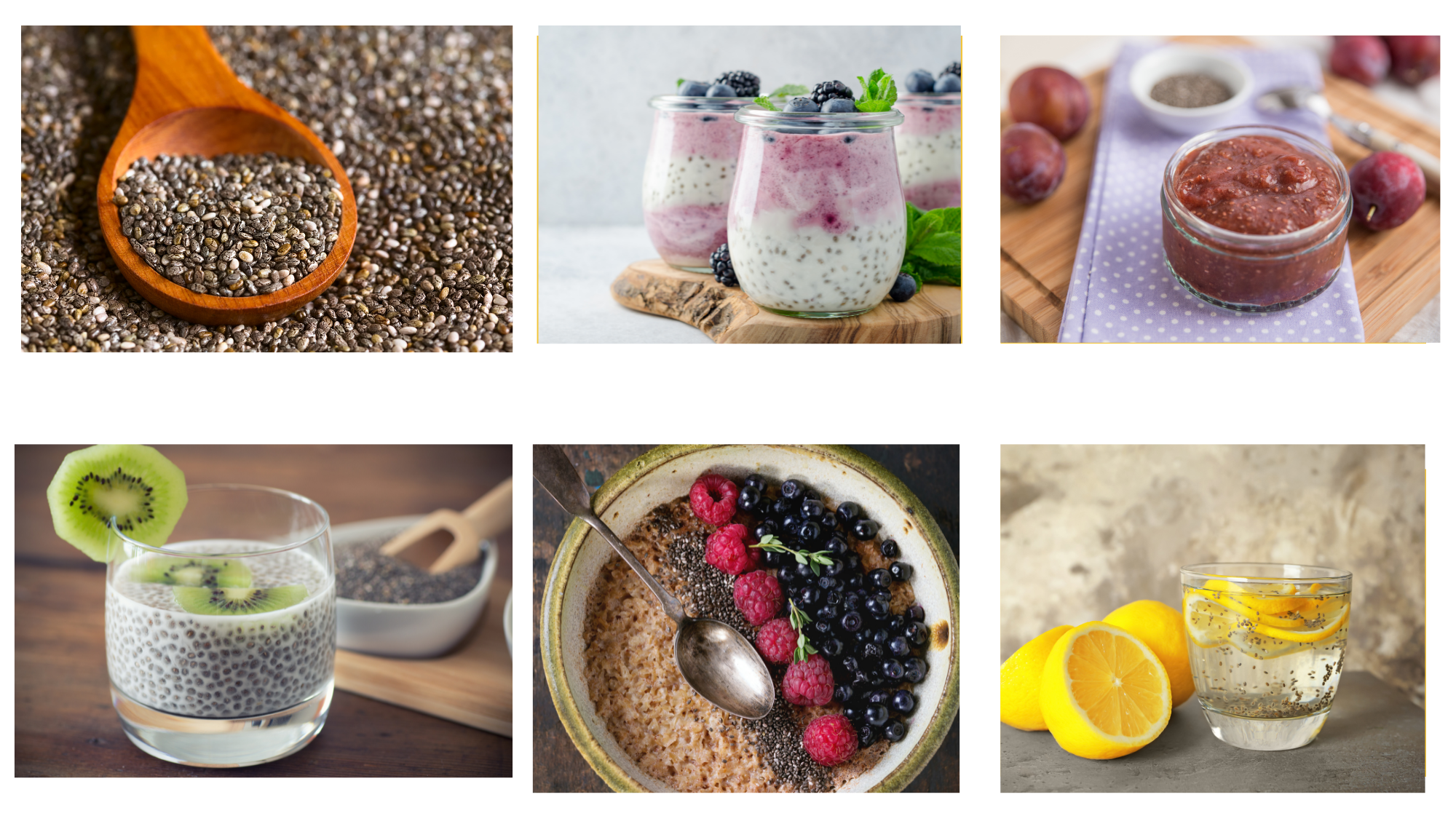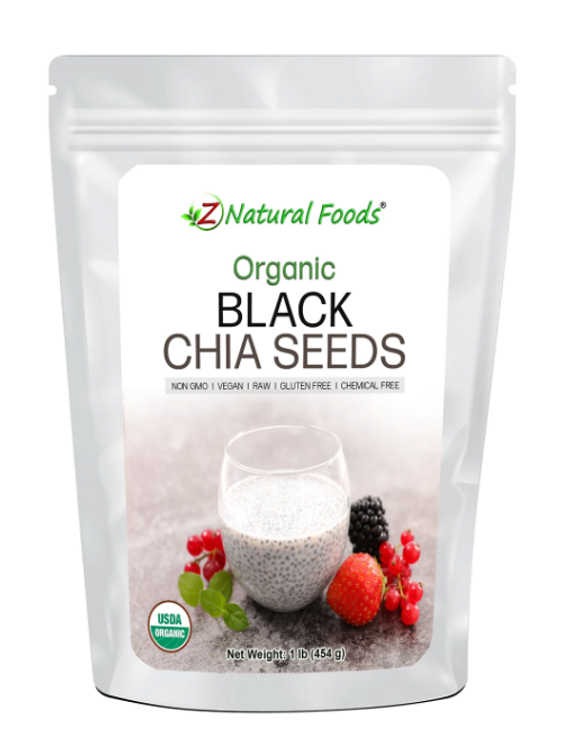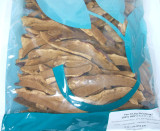Herbal Information on Chia Seed, Whole Certified Organic
Common Name: Chia Seed, Wild Chia Seed
Botanical Name: Salvia hispanica
Other Ingredients: None, nothing has been added to this product.
Package Size: 1 pound
Form: Whole seed
Dosage: Follow doctors instructions on how to use this herb.
Certified Organic: Yes
Origin: USA
Brand:
Cautions: Do not use if pregnant or nursing.
California Prop 65
Additional Information:
 Benefits of Chia Seeds
Benefits of Chia Seeds
- Commonly used when cooking breads, cakes, muffins, biscuits, or oatmeal
- Good Source for Omega - 3 Fatty Acids
- Contains Vitamins and Minerals such as Calcium, Potassium, and Iron
- Benefits Digestion
- Supports the Cardiovascular System
- Aids in Building Healthy Bones
- Promotes Regularity of Bowel Movements
- Aids in Healthy Skin
- Promoting Normal Blood Pressure
- High in Phosphorus and Magnesium
- Encourages Balancing of Blood Sugar
- Enhances Oral Health
- Chia seeds are one of the best sources of plant protein, a whopping 14% protein overall
History of Chia Seeds
Chia Seed is a member of the Mint family, however it was not very widely known outside of Mexico and the southwestern United States until recently. In prehispanic times the Chia Seed was one the most important foods of the Aztecs. When translated from the Mayan language, the word Chia means "Strength".
The taste of the Chia seed, is somewhat bland, which allows for it to be blended into almost any smoothie, puddings or baked goods.
Chia Seed has become popular again due to its many benefits. Chia Seed is very rich in antioxidants, omega-3 fatty acids, vitamins, minerals and fiber. Chia Seed can be eaten raw as a dietary fiber, or Chia Seed can be ground up and used it to create a meal called pinole. Like corn meal, pinole can be used to make cakes, breads, biscuits and porridge's.
Chia seeds, derived from the plant Salvia hispanica, have a rich history that spans centuries and multiple cultures. Here's an overview of the history of chia seeds:
Ancient Mesoamerica: Chia seeds have been cultivated for thousands of years in Mesoamerica, which includes parts of modern-day Mexico and Guatemala. The Aztecs and Mayans were among the earliest known cultivators of chia seeds. Chia was a staple crop and played a significant role in the diet of these ancient civilizations.
Nutritional Powerhouse: Chia seeds were highly valued for their nutritional content. They are rich in omega-3 fatty acids, dietary fiber, protein, and various vitamins and minerals. Chia seeds provided a sustainable source of energy for the Aztecs and Mayans, particularly for warriors and long-distance runners.
Cultural and Religious Significance: Chia seeds held cultural and religious significance in these ancient societies. Chia was sometimes used in religious ceremonies and offerings. In some cultures, it was considered a symbol of strength and endurance.
Colonial Suppression: With the Spanish colonization of the Americas in the 16th century, many indigenous crops, including chia, faced suppression as European crops took precedence. Chia cultivation declined, and its use diminished among indigenous populations.
Rediscovery in the 20th Century: Chia seeds largely disappeared from the Western diet for centuries until the 20th century when they experienced a resurgence in popularity. Scientists and nutritionists began to recognize the health benefits of chia seeds, leading to increased interest in their consumption.
Modern Health Food: Chia seeds gained recognition as a superfood in the 21st century. They are known for their ability to absorb liquid and form a gel-like substance, making them popular in recipes for puddings, smoothies, and as an egg substitute in vegan baking. Chia seeds have also become a common ingredient in energy bars, cereals, and other health-oriented products.
Commercial Farming: Today, chia seeds are grown not only in their native regions but also in various countries around the world, including Australia, Argentina, and the United States. Commercial farming and production have increased to meet the growing global demand for chia seeds.
Health Benefits: Chia seeds are recognized for their potential health benefits, which include promoting heart health, aiding digestion, and supporting weight management. Their high fiber content helps with satiety and digestive regularity, and their omega-3 fatty acids have anti-inflammatory properties.
Culinary Versatility: Chia seeds are versatile and can be used in a wide range of dishes, from smoothies and oatmeal to salads and baked goods. They have become a popular ingredient in the diets of health-conscious individuals.
Chia seeds have come a long way from their ancient roots as a staple crop of indigenous civilizations in Mesoamerica to their modern status as a sought-after superfood known for their nutritional value and versatility in the kitchen.
Chia seeds are a concentrated food contained in about two tablespoons full:
- Omega 3
- Fatty acids
- Carbohydrates
- 139 calories
- 4 Grams of protein
- 9 grams of fat
- 11 grams of fiber
- Plus vitamins, minerals and antioxidants.
- There are 205 milligrams of calcium in a serving of Chia seeds

Chia seeds are incredibly versatile and can be used in a variety of recipes to add texture, nutrition, and a boost of omega-3 fatty acids. Here are some delicious and easy recipes that incorporate chia seeds:
Chia Seed Pudding:
Ingredients:
- 1/4 cup chia seeds
- 1 cup milk (dairy or non-dairy)
- 1-2 tablespoons sweetener (honey, maple syrup, or agave nectar)
- 1/2 teaspoon vanilla extract
- Fresh berries or sliced fruit for topping
Instructions:
- In a bowl, mix chia seeds, milk, sweetener, and vanilla extract.
- Stir well to combine and break up any clumps.
- Refrigerate for at least 2 hours, or overnight, stirring occasionally.
- Serve topped with fresh fruit.
Chia Jam:
Ingredients:
- 2 cups fresh or frozen berries (e.g., strawberries, blueberries, raspberries)
- 2 tablespoons chia seeds
- 1-2 tablespoons sweetener (honey, maple syrup, or sugar)
- 1/2 teaspoon vanilla extract (optional)
Instructions:
- In a saucepan, heat the berries and sweetener over medium heat until they start to break down and release their juices.
- Mash the berries with a fork or potato masher to your desired consistency.
- Stir in the chia seeds and vanilla extract.
- Remove from heat and let the mixture cool.
- Transfer to a jar and refrigerate. The jam will thicken as it cools.
Chia Seed Oatmeal:
Ingredients:
- 1/2 cup rolled oats
- 1 cup milk (dairy or non-dairy)
- 2 tablespoons chia seeds
- 1/2 teaspoon cinnamon
- Toppings: sliced bananas, nuts, and honey
Instructions:
- In a saucepan, combine oats and milk. Cook over medium heat, stirring occasionally, until the oats are tender and the mixture thickens.
- Stir in chia seeds and cinnamon.
- Cook for an additional 2-3 minutes until the chia seeds soften and the mixture thickens further.
- Serve hot with your favorite toppings.
Chia Seed Smoothie:
Ingredients:
- 1 cup frozen mixed berries
- 1 banana
- 1 cup spinach or kale leaves
- 1 tablespoon chia seeds
- 1 cup milk (dairy or non-dairy)
- 1-2 tablespoons honey or maple syrup (optional, for sweetness)
Instructions:
- Combine all ingredients in a blender.
- Blend until smooth and creamy.
- Adjust sweetness to taste.
- Pour into a glass and enjoy.
These recipes are just a starting point. Chia seeds can be added to yogurt, salads, cereal, or even used as an egg substitute in baking. Experiment with different flavor combinations and find your favorite ways to incorporate chia seeds into your diet.
Laboratory Analysis
Samples are retained from all shipments are thoroughly tested and compared to our extensive reference library of dried herbs and botanicals to verify authenticity. All lot samples are kept for five years and can be traced for verification.
References:
http://www.well-beingsecrets.com/benefits-of-chia-seeds/
https://www.mayoclinichealthsystem.org/hometown-health/speaking-of-health/chia-seeds-pack-nutritional-punch#:~:text=Chia%20seeds%20are%20an%20excellent,developing%20diabetes%20or%20heart%20disease.
http://www.foodmatters.com/article/14-proven-health-benefits-of-chia-seeds
https://www.ncbi.nlm.nih.gov/pmc/articles/PMC3518271/
https://health.clevelandclinic.org/benefits-of-chia-seeds/
https://www.hsph.harvard.edu/nutritionsource/food-features/chia-seeds/
https://www.prevention.com/food-nutrition/healthy-eating/a19596889/health-benefits-of-chia-seeds/



















